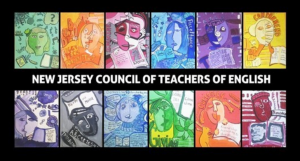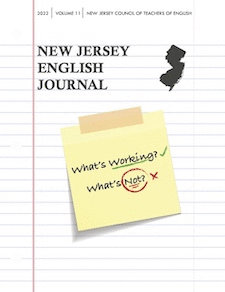From the Editors of the NJ English Journal:
This letter is modified from the 2019 edition of the New Jersey English Journal, which can be found in full at https://www.njcte.org/n-j-english-journal. The table of contents and the call for manuscripts will follow in our next blog posts.
 The Intersection of Literacy and Democracy:
The Intersection of Literacy and Democracy:
What role does language arts play in a free society?
Literature allows us to be open, to listen to others and be curious.
Tracy K. Smith, Poet Laureate of the United States
Reflecting on the 2019 edition of the New Jersey English Journal’s theme regarding the intersection of Literacy and Democracy, we may envision Civil Rights leaders like John Lewis, who remind us about the stringent and often unfair literacy tests which prevented even educated people of color from voting.
Or the famed memoir Narrative of the Life of Frederick Douglass, where Douglass stresses that learning to read and write gave him the tools to be viewed as fully human by others – and by himself: “Once you learn to read, you will be forever free,” he wrote.
Or the reports around the world, that the vast majority of illiterates are female. Why? Again, literacy is the means to freedom, and denying others literacy is a blatant form of oppression.
Moreover, the intersection of democracy and literacy must contain a generous space for listening, whether it is listening via reading others’ memoirs or listening to our students and colleagues. There can be no real dialogue without genuine listening. This may seem obvious, but listening brings its own demand, especially when the speakers and listeners do not agree – initially or ever. Zora Neale Hurston tell us, “There are years that ask questions, and years that answer them.” We are not always in the position to have sufficient time to listen to others, yet as teachers, and in this instance editors, we remain cognizant – even vigilant – about what it means to listen.
We have both been fortunate to work for a number of years as editors and judges – we have listened to a wide range of voices. Writers have challenged our own perspectives; most often they have broadened them. Liz as the editor-in-chief of this journal and various textbooks, and Patricia as one of the judges of the Geraldine R. Dodge Poetry Contest for high school students, Associate Editor of Peregrine, a literary magazine; both of us have served as writing coaches, paid or pro bono, for countless scholarships, fellowships, and residency applicants. In these cases, we are listening deeply to the life of another, as we have been trusted to help the applicant win a prize, secure needed funding, or create time to work on important projects. Without listening deeply, we cannot help. Each one of our voices is important, and we all need to work consistently on ways to make ourselves heard.
We have had the advantage – for 30 years – of a key resource in our work. We are friends as well as colleagues. We have trusted each other enough to listen. Of course, we do not always agree. Our lives have been shaped by very different life experiences and will continue to be. So, what is the common ground? We are not inclined to suggest a recipe, but trust and curiosity have to be in the mix.
How does this connect to the theme of The Intersection of Literacy and Democracy: What role does language arts play in a free society? Our responsibilities as editors, as teachers, as citizens involve listening even when it is difficult to do so.
The various entries of this journal present opportunities to listen to voices and views we may not have heard before, such as the views of a teacher who is offering ideas for “developing global competencies” or one wondering about graffiti on a desk.
We hear reminders of the ever-present connection between literacy and democracy in Sara deBeer’s poem about teaching poetry to homeless students. We hear it in the speeches and tweets by March for Our Lives student leaders, and depicted on the graffiti board from the 2018 Spring Conference. We hear it in Sheryl Lain’s “Picture Books Teach Empathy and Much More,” where she asserts that picture books’ messages of empathy and tolerance help model a more democratic classroom, because they demonstrate “Listening, sharing words, and working with others [which] not only creates a warm classroom but also works to develop better citizens outside of the classroom.”
This is our last year as editors of this journal; we gratefully and proudly introduce the next editors: Lauren Zucker and Emily Hodge. This tradition of collaboration continues, as Julius Gottilla reflects on his role as a former editor of this journal in his essay: “About Relationships, Not Prerogatives: Editing the New Jersey English Journal.” Julius stresses that the most important byproduct of his work is the friendships he developed among the editors and the writers.
We also develop relationships with the readers, some we may never meet. When we listen, when we read others’ words, we often feel some connection, which, with hope, humanizes us and deepens our commitment to learning, to justice, to democracy. While our roles are shifting, we intend to remain involved with this organization and to continue learning from each other.
Thank you for being part of our community of learners and teachers. We hope you visit the website www.njcte.org to read the journal and learn more about what we offer for New Jersey’s ELA teachers.
Sincerely,
Liz deBeer, Editor, and Patricia Bender, Assistant Editor
New Jersey English Journal, 2016 -2019



 We are thrilled to announce the publication of the
We are thrilled to announce the publication of the  The Intersection of Literacy and Democracy:
The Intersection of Literacy and Democracy: New Jersey Council of Teachers of English, the New Jersey state affiliate of NCTE, the National Council of Teachers of English
New Jersey Council of Teachers of English, the New Jersey state affiliate of NCTE, the National Council of Teachers of English

 NJCTE was among the many
NJCTE was among the many 